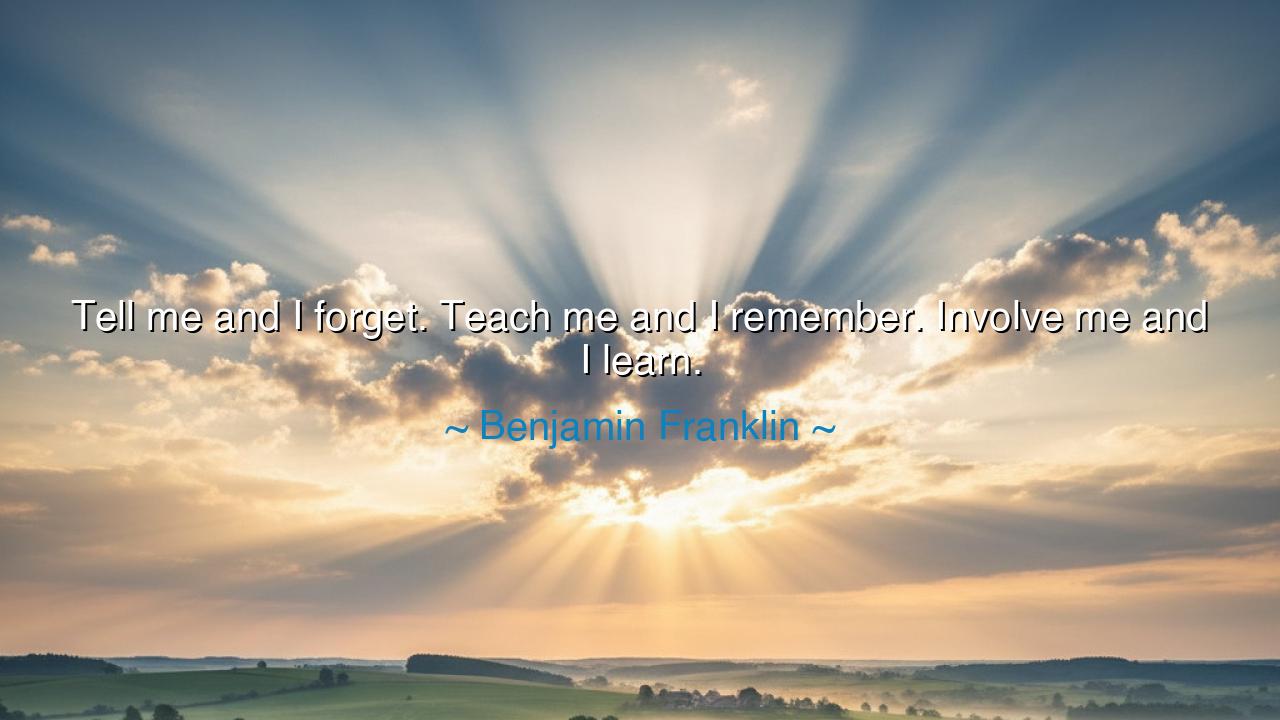
Tell me and I forget. Teach me and I remember. Involve me and I






“Tell me and I forget. Teach me and I remember. Involve me and I learn.”
So spoke Benjamin Franklin, one of the great minds of the Enlightenment, whose wisdom shone not only in invention and science but in the deep understanding of human growth. These words, though gentle in tone, thunder with eternal truth. They speak to the sacred process of learning — how knowledge does not merely enter the ear, but must touch the hands, the heart, and the soul before it becomes one’s own. For to be told is to hear a passing wind; to be taught is to grasp a shadow of understanding; but to be involved — to live, to act, to experience — is to awaken the full light of wisdom within.
The first phrase, “Tell me and I forget,” reveals the frailty of words without experience. The mind, like a vessel left uncovered, cannot hold what it does not use. Many have sat beneath the teachings of the wise, nodding in understanding, yet when the test of life came, their knowledge slipped through their fingers like sand. The ancients knew this well — that hearing alone does not make one wise. For the mind remembers stories, but the spirit remembers only what it has done.
The second phrase, “Teach me and I remember,” carries a deeper step. To be taught is to be guided, to be led from ignorance toward comprehension. Yet even then, memory is a fragile bridge. It is through repetition, reflection, and reverence for the lesson that remembrance endures. When the disciple listens with intention, the spark of knowledge begins to glow. But still, it is only potential — a flame awaiting the breath of experience to give it life. Teaching plants the seed, but the soil must be stirred for growth to come.
Then comes the heart of Franklin’s wisdom: “Involve me and I learn.” Here lies the true transformation — for to be involved is to unite thought and action. The one who acts upon knowledge transforms it from idea into truth. This is the sacred art of learning by doing. The farmer who sows, the artist who paints, the warrior who trains — each learns not by hearing, but by living the lesson. Experience is the forge in which wisdom is made solid and enduring. Without it, even the brightest mind remains hollow.
Consider the story of Thomas Edison, who failed more than a thousand times before creating the light bulb. He was not merely told about electricity, nor taught its theories from afar — he involved himself in the struggle. Each failure was a teacher; each spark, a revelation. His learning did not come from lectures, but from labor. Thus, through trial and perseverance, he turned knowledge into power, and darkness into light for all mankind. His journey stands as a living echo of Franklin’s truth — that only through engagement with the world does true understanding take root.
There is also a gentler example — that of a child learning to walk. You may tell the child how to balance, you may teach them where to place their feet, but only when they walk — stumble, fall, rise again — do they truly learn. Involvement is not only about doing; it is about becoming. To learn through experience is to allow the soul to grow through struggle, patience, and discovery. The hands and heart become the vessels through which wisdom flows.
Thus, the lesson of this quote reaches beyond the classroom and into the living of life itself. To those who seek growth, let them remember: learning is participation, not observation. The wise do not wait to be told; they step into the stream of life and learn by swimming. The lazy learner blames the teacher; the true seeker blames only his own unwillingness to act. Therefore, let every person strive not just to listen, but to do — not just to understand, but to live their understanding.
So, my child of the future, let these words guide your days: when wisdom speaks, do not merely hear; when truth calls, do not merely ponder — move, act, involve yourself. Learn through the doing, for that is how the soul ripens. Build your wisdom not in words but in works. And when your hands have shaped what your heart believes, you shall stand among the truly learned — not as one who remembers, but as one who knows.






AAdministratorAdministrator
Welcome, honored guests. Please leave a comment, we will respond soon